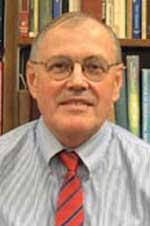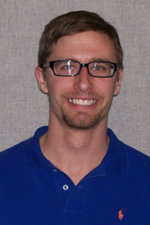 Congratulations to Daheia Barr-Anderson, Ph.D., assistant professor in the School of Kinesiology, who was elected to the American College of Sports Medicine (ACSM) Board of Trustees. She will serve a three-year term ending in 2021. Barr-Anderson is also director of the Behavioral Physical Activity Laboratory (BPAL) in the School.
Congratulations to Daheia Barr-Anderson, Ph.D., assistant professor in the School of Kinesiology, who was elected to the American College of Sports Medicine (ACSM) Board of Trustees. She will serve a three-year term ending in 2021. Barr-Anderson is also director of the Behavioral Physical Activity Laboratory (BPAL) in the School.
Konczak publishes with Italian partners in Behavioural Brain Research
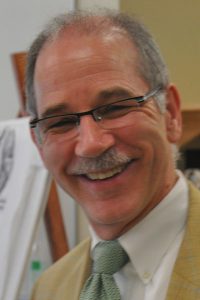

Jürgen Konczak, Ph.D., professor in the School of Kinesiology and director of the Human Sensorimotor Control Laboratory (HSCL), has published a paper with colleagues in Behavioural Brain Research. “Consolidation of human somatosensory memory during motor learning” is a collaboration with colleagues from the Italian Institute of Technology. Dr. Anna Vera Cuppone, first author, spent 9 months in HSCL as a visiting scholar, and the data were collected both at HSCL and in Italy.
The main idea behind the paper is to understand how memory is formed during motor learning. Researchers looked at a form of memory related to body awareness, i.e., “how it feels” when the body performs the newly acquired movement patterns. Research in the last years has recognized that such somatosensory and motor learning go hand-in-hand to form “motor memory.” Researchers show how training body awareness improves skill level. The impact of this work relates to neurorehabilitation, because people with stroke that affects the somatosensory cortex, i.e., the part of the brain involved with somatosensory learning, are the most difficult patients to recover. Sensory-based motor learning may help them to recover faster and more completely.
Barr-Anderson delivers seminar presentation to UW-Madison’s Department of Kinesiology
On March 9, Daheia Barr-Anderson, Ph.D., assistant professor and director of the Behavioral Physical Activity Laboratory (BPAL) in the School of Kinesiology, presented “Halting the Obesity Trajectory: Family-based Interventions for African-American Females” to the Department of Kinesiology at the University of Wisconsin-Madison.
Christiana Raymond-Pope is lead author on article published in Journal of Strength and Conditioning Research
Christiana Raymond-Pope, M.S., doctoral student in the School of Kinesiology, is the lead author of an article published in the Journal of Strength and Conditioning Research. The article, “Total and segmental body composition examination in collegiate football players using multifrequency bioelectrical impedance analysis and dual x-ray absorptiometry,” examines the influence of player position on the agreement between multifrequency bioelectrical impedance analysis and dual X-ray absorptiometry when assessing total and segmental percent body fat, fat mass, and fat-free mass in National Collegiate Athletic Association Division I collegiate football athletes. Donald R. Dengel, Ph.D., a professor of kinesiology and director of the Laboratory of Integrative Human Physiology, and Tyler Bosch, Ph.D., a graduate of the School of Kinesiology, are also co-authors on the article.
Hayley Pierce-Ramsdell, Kinesiology B.S., awarded UROP grant to work in APAL
Hayley Pierce-Ramsdell, Kinesiology B.S. student, has been awarded a UROP grant that will support her work as an undergraduate research assistant in the Affordance Perception-Action Laboratory (APAL) directed by Thomas Stoffregen, Ph.D. Hayley’s funded project is “The Role of Chromaticity in the Visual Control of Stance.” Her adviser for the project is Dr. Stoffregen, and she will be working directly with Kinesiology Ph.D. student Ruth Rath.
Wade publishes response to commentaries in Human Movement Science
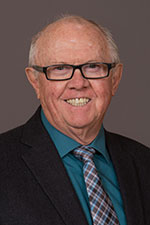 Michael Wade, Ph.D., professor in the School of Kinesiology, has published a response to three commentaries on an article he co-authored with Mackinzee Kazek, “Developmental coordination disorder and its cause: The road less travelled,” made available online in Human Movement Science, November, 2016.
Michael Wade, Ph.D., professor in the School of Kinesiology, has published a response to three commentaries on an article he co-authored with Mackinzee Kazek, “Developmental coordination disorder and its cause: The road less travelled,” made available online in Human Movement Science, November, 2016.
The commentaries reacted to the article’s views about the theoretical and empirical challenges of explaining the possible underlying cause of developmental coordination disorder (DCD). Wade’s response, “Mostly ‘Old wine in new bottles.’ Reply to commentaries, appears in the February 2018 online edition of Human Movement Science.
Dengel presents at East Carolina University
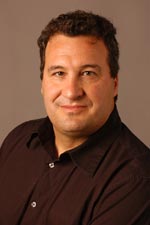
Donald R. Dengel, Ph.D., professor in the School of Kinesiology and director of the Laboratory of Integrative Human Physiology, presented at East Carolina University’s Department of Kinesiology in Greenville, NC, on February 27. The title of Dr. Dengel’s talk was, “From Peripheral to Cerebral Blood Vessels: The Impact of Vascular Dysfunction.”
Smith is author of book chapter in Wellbeing in Higher Education
Thomas Smith, Ph.D., adjunct instructor in the School of Kinesiology, is the author of a chapter in a newly published book by Routledge, Wellbeing in Higher Education: Cultivating a Healthy Lifestyle Among Faculty and Students.
Smith’s chapter, “Ergonomic and Ecological Perspectives,” discusses how the design of post-secondary systems influences student wellbeing.
Greising publishes in Cell Death Discovery
 Sarah Greising, Ph.D., assistant professor in the School of Kinesiology, has published an article in the online journal, Cell Death Discovery. “Multiscale analysis of a regenerative therapy for treatment of volumetric muscle loss injury” explores the regenerative process of injured skeletal muscles resulting from major traumatic injury. The study results suggest that the pathological response to volumetric muscle loss (VML) injury during the acute stage of the healing response overwhelms endogenous and therapeutic regenerative processes.
Sarah Greising, Ph.D., assistant professor in the School of Kinesiology, has published an article in the online journal, Cell Death Discovery. “Multiscale analysis of a regenerative therapy for treatment of volumetric muscle loss injury” explores the regenerative process of injured skeletal muscles resulting from major traumatic injury. The study results suggest that the pathological response to volumetric muscle loss (VML) injury during the acute stage of the healing response overwhelms endogenous and therapeutic regenerative processes.
School of Kinesiology alumnus featured in Florida Today
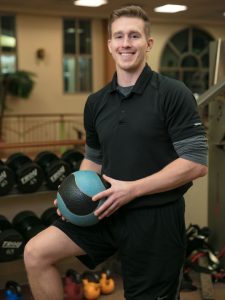 Matthew Duffy, a 2013 alumni of the School of Kinesiology, was profiled in Florida Today. Duffy received his B.S. in kinesiology with an emphasis in exercise science. He is currently a clinical integration specialist at Health First’s Pro Health and Fitness Center in Viera, Florida. Duffy works with a variety of patients, including cardiac, post-rehab and people with disabilities, and conducts physical and postural assessments, creates strength training workouts and program design, and assists in flexibility training and assisted stretching.
Matthew Duffy, a 2013 alumni of the School of Kinesiology, was profiled in Florida Today. Duffy received his B.S. in kinesiology with an emphasis in exercise science. He is currently a clinical integration specialist at Health First’s Pro Health and Fitness Center in Viera, Florida. Duffy works with a variety of patients, including cardiac, post-rehab and people with disabilities, and conducts physical and postural assessments, creates strength training workouts and program design, and assists in flexibility training and assisted stretching.
PAEL lab’s Pope, Zeng, Lee, and Gao publish in Translational Behavioral Medicine
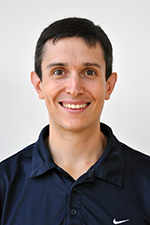
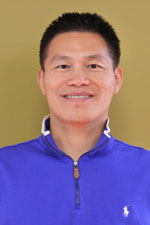
Zachary Pope, Ph.D. candidate in the School of Kinesiology and a member of the Physical Activity Epidemiology Laboratory (PAEL), is first author on a recently published article in Translational Behavioral Medicine titled, “Feasibility of Smartphone Application and Social Media Intervention on Breast Cancer Survivors’ Health Outcomes.” The article’s co-authors include lab member Nan Zeng, Ph.D. candidate, former lab member June Lee, Ph.D., Zan Gao, Ph.D., lab director, as well as Hee Yun Lee, Ph.D. from the University of Alabama.
The study investigates the feasibility of employing a commercially available mobile health application and social media-based health education intervention to improve breast cancer survivors’ physical activity and health. Observations indicate that the 10-week intervention designed to increase physical activity duration and steps per day decreases body weight and body fat percentage. Improvements in breast cancer survivors’ quality of life were also observed.
Dengel and colleagues publish in Metabolic Syndrome and Related Disorders
Donald R. Dengel, Ph.D., professor in the School of Kinesiology and director of the Laboratory of Integrative Human Physiology, and colleagues have published in the online publication, Metabolic Syndrome and Related Disorders.
The article, “Association between carotid intimata media thickness, age, and cardiovascular risk factors in children and adolescents,” describes their study to determine the relations of measures of carotid intima media thickness with body mass index and cardiovascular risk score in children. The study concluded that maintaining normal levels of adiposity and other risk variables may be useful in preventing early changes associated with preclinical atherosclerosis.
Stoffregen publishes in newest Kinesiology Review issue
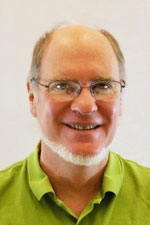 Tom Stoffregen, Ph.D., professor in the School of Kinesiology and director of the Affordance Perception-Action Laboratory, published in a recent issues of Kinesiology Review. In his article titled “Ecological Physics and the Perceptual Information That Supports Motor Control,” he discusses the nature of perceptual information and implications for kinesiology.
Tom Stoffregen, Ph.D., professor in the School of Kinesiology and director of the Affordance Perception-Action Laboratory, published in a recent issues of Kinesiology Review. In his article titled “Ecological Physics and the Perceptual Information That Supports Motor Control,” he discusses the nature of perceptual information and implications for kinesiology.
Kinesiology Review is the official publication of the National Academy of Kinesiology (NAK) and the American Kinesiology Association (AKA).
Former LIHP graduate student is author of recently published paper
Joe Ostrem, Ph.D., a 2016 graduate from the School of Kinesiology and former member of the Laboratory of Integrative Human Physiology (LIHP), is the lead author of an article recently published in the journal, Clinical Physiology and Functional Imaging. The article, entitled “Intra- and Interday reproducibility of high-flow-mediated constriction response in young adults” examined the reproducibility of a method to measure vascular health. The results of this study indicate high-flow-mediated constriction is reproducible in young adults and should be included to assess vascular health. Donald R. Dengel, Ph.D., professor of kinesiology and director of the LIHP in the School of Kinesiology, Ostrem’s adviser, is a co-author on this article, as well as current lab members Nick Evanoff and Justin Ryder.
Wiese-Bjornstal quoted in corporate publication 3M Particles
Diane Wiese-Bjornstal, Ph.D., professor in the School of Kinesiology and director of the Sports Medicine Psychology Laboratory, is quoted in the article, “Don’t let your injury get the best of you: The role of mental fitness in rehabilitation,” by Janna Fischer. It appears in the online corporate publication, 3M Particles, which features stories about science applied to life. The article discusses the mental challenges of returning from sport- and exercise-related injuries.
HSC lab publishes first study in 2018 on abnormal muscle activity in horses with shivers disease
 In an interdisciplinary collaboration with partners in veterinary medicine at the University of Minnesota and the Michigan State University, researchers in the Human Sensorimotor Control Laboratory examined horses with shivers disease.
In an interdisciplinary collaboration with partners in veterinary medicine at the University of Minnesota and the Michigan State University, researchers in the Human Sensorimotor Control Laboratory examined horses with shivers disease.
An earlier study identified the previously unknown neuropathology of the disease – a degeneration of neurons in the cerebellum. Because the cerebellum is involved in coordinating the control of muscles during movement, the researchers wanted to find out how the loss of cerebellar function affects the muscle recruitment in these horses. Like humans, horses activate more muscle fibers if they want to run faster. However, these horses recruited more muscles and more muscle fibers than necessary, which led to a loss of movement coordination and problems in their balance.
The results of this study, “Abnormal locomotor muscle recruitment activity is present in horses with shivering and Purkinje cell distal axonopathy,” are published in a paper that appears in Equine Veterinary Journal. Joshua Aman, Ph.D., a former postdoctoral researcher in the lab, is the first author of the paper. Other co-authors are current lab member Naveen Elangovan, Ph.D., and Jürgen Konczak, Ph.D., professor in the School of Kinesiology.
Dengel presents at University of Utah
 Donald R. Dengel, Ph.D., professor of kinesiology and director of the Laboratory of Integrative Human Physiology, presented at the University of Utah in the Department of Health, Kinesiology, and Recreation on February 5. The title of Dr. Dengel’s talk was “Measuring Vascular Function: From Peripheral to Cerebral.”
Donald R. Dengel, Ph.D., professor of kinesiology and director of the Laboratory of Integrative Human Physiology, presented at the University of Utah in the Department of Health, Kinesiology, and Recreation on February 5. The title of Dr. Dengel’s talk was “Measuring Vascular Function: From Peripheral to Cerebral.”
Barr-Anderson presents at Minne-College in Arizona
 Daheia Barr-Anderson, Ph.D., assistant professor and director of the Behavioral Physical Activity Laboratory (BPAL) in the School of Kinesiology, presented at Minne-College in Arizona held in Scottsdale, AZ, on February 10. The title of her presentation was “Move More to Weigh Less: The Importance of Physical Activity to Address Childhood Obesity.” Also attending were CEHD Dean Jean Quam, Serena Wright, CEHD Sr. Alumni Director, and a number of U of M alumni. Minne-College in Arizona is sponsored by the U of M Alumni Association.
Daheia Barr-Anderson, Ph.D., assistant professor and director of the Behavioral Physical Activity Laboratory (BPAL) in the School of Kinesiology, presented at Minne-College in Arizona held in Scottsdale, AZ, on February 10. The title of her presentation was “Move More to Weigh Less: The Importance of Physical Activity to Address Childhood Obesity.” Also attending were CEHD Dean Jean Quam, Serena Wright, CEHD Sr. Alumni Director, and a number of U of M alumni. Minne-College in Arizona is sponsored by the U of M Alumni Association.
Konczak gives talk to U of M ataxia group colloquium
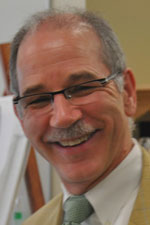 Juergen Konczak, Ph.D., professor in the School of Kinesiology and director of the Human Sensorimotor Control Laboratory, gave a lecture on “Somatosensory training to overcome motor dysfunction in dystonia and Parkinson’s disease” to the University of Minnesota ataxia research group. The ataxia group is an interdisciplinary group of basic science and clinical researchers interested in understanding the neuropathology of ataxia and its treatment. Dr. Konczak spoke about how a sensory-based rehabilitation training can improve motor function in focal dystonia and Parkinson’s disease.
Juergen Konczak, Ph.D., professor in the School of Kinesiology and director of the Human Sensorimotor Control Laboratory, gave a lecture on “Somatosensory training to overcome motor dysfunction in dystonia and Parkinson’s disease” to the University of Minnesota ataxia research group. The ataxia group is an interdisciplinary group of basic science and clinical researchers interested in understanding the neuropathology of ataxia and its treatment. Dr. Konczak spoke about how a sensory-based rehabilitation training can improve motor function in focal dystonia and Parkinson’s disease.
KARE-11 features Tucker Center’s Women Coaches Report in story on National Girls and Women in Sports Day
 KARE 11 TV gave a nod to the Tucker Center’s 2017- 18 Head Coaches of Women’s Collegiate Teams: A Report on Seven Select NCAA Division-I Conferences in their story related to the National Girls and Women in Sports Day celebration on February 7. Nicole LaVoi, Ph.D., lecturer in the School of Kinesiology and co-director of the Tucker Center, was interviewed for the story and said the report “hopefully stimulates dialogue, raises awareness, helps to recruit and retain more women in the coaching profession, and holds decision-makers who hire coaches more accountable.”
KARE 11 TV gave a nod to the Tucker Center’s 2017- 18 Head Coaches of Women’s Collegiate Teams: A Report on Seven Select NCAA Division-I Conferences in their story related to the National Girls and Women in Sports Day celebration on February 7. Nicole LaVoi, Ph.D., lecturer in the School of Kinesiology and co-director of the Tucker Center, was interviewed for the story and said the report “hopefully stimulates dialogue, raises awareness, helps to recruit and retain more women in the coaching profession, and holds decision-makers who hire coaches more accountable.”





